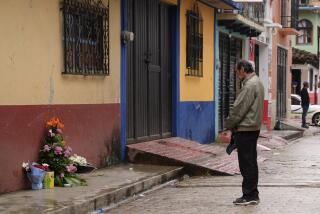Bloodshed at the border
- Share via
For those in the know, the little village of Palomas offered up a glimpse of Old Mexico that has become scarce in the border towns that often are little more than transit points for Mexicans heading farther north. Once home to folk-hero and bandit Francisco “Pancho” Villa, it had a bustling, dusty charm, with street vendors hawking tooled leather saddles and Popsicles to American tourists. More recently, it had become a destination for uninsured Americans seeking dental, medical and optical care.
But no longer. The bandits are back. Mexico’s drug war has come to Palomas.
The town has literally become lawless. Last week, its terrified police chief fled across the border, seeking asylum in the United States, saying his two deputies had abandoned him and that he feared for his life. News accounts quoting U.S. Border Patrol spokesman Doug Mosier reported that Emilio Perez presented himself at the international port of entry in Columbus, N.M., just a few miles north of Palomas. Mosier said he’d never seen such a thing. And Perez’s plea for sanctuary, first reported by the Associated Press, zipped from one news outlet to another with all the shock value of a “Man Bites Dog” story -- or rather, “Cop Flees Robbers.”
But this is a sobering turn of events, and it should focus attention on the escalating violence on our border. Mexico’s drug war is not just a metaphor, it’s a war. More than 2,500 people a year die in the conflict, and those law enforcement officials who take on the drug cartels are prime targets for assassination. As The Times’ Richard Marosi reported earlier this year, one outspoken opponent of the cartels was attacked at his home by gunmen three days before he became Tijuana’s secretary for public security. Fortunately, Alberto Capella Ibarra had sent his wife and children to live elsewhere, and by defending himself in the shootout, he survived. Still, his enemies merely shifted targets. Three of Capella’s senior officers were later gunned down, along with the wife and two daughters of one of them.
Yet if Capella’s determination to stay in the job shows almost superhuman bravery, that doesn’t mean Perez’s flight is an act of cowardice. Both men, and thousands of others like them, have been forced into death-defying feats and no-win choices because of a war whose ferocity, so far, has no end in sight.
More to Read
Sign up for Essential California
The most important California stories and recommendations in your inbox every morning.
You may occasionally receive promotional content from the Los Angeles Times.










